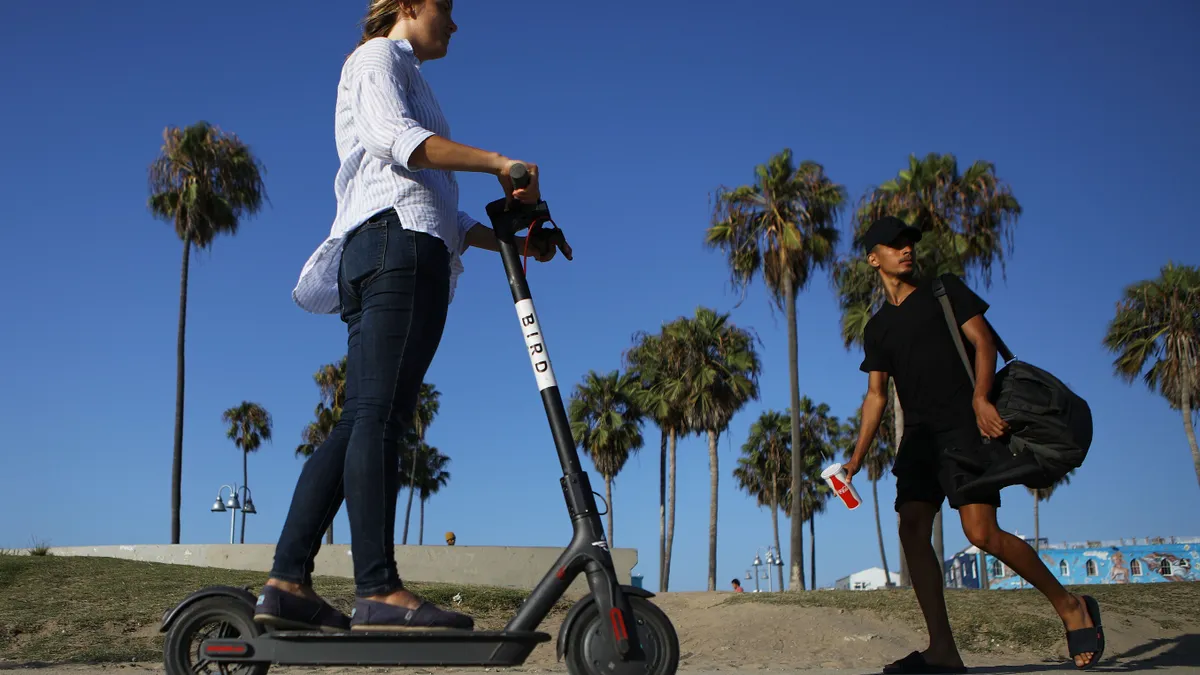Micromobility operator Bird Global reports its finances are improving after more than a year of turmoil, but the company is not yet out of the woods and is planning more layoffs in the third quarter, according to its SEC filings. Bird’s bumpy trajectory, which also includes leadership shakeups and lawsuits, suggests an unpredictable future.
On its second quarter earnings call Aug. 9, leadership was optimistic about Bird’s prospects. “I am confident that we will continue to show progress across all metrics as we bring a renewed focus on operational excellence,” interim CEO Michael Washinushi said on the call. Washinushi, Bird’s CFO since January, was named interim CEO the day the earnings report was released. Shane Torchiana, who had served as president and CEO since September 2022, was terminated, the South Florida Business Journal reported Aug. 10.
Bird has struggled since going public in late 2021. The company’s stock tumbled following its opening on the New York Stock Exchange, and last summer Bird began to lay off nearly a quarter of its staff. In fall 2022, Bird ceased scooter operations in several small and midsized cities. (The company also left San Francisco earlier this year.) To close out a tumultuous 2022, Bird filed a November 2022 SEC report acknowledging that it had overstated its revenue for more than two years due to uncollected rider balances. Investors have since filed a class-action lawsuit against the company.
Bird’s Q2 revenue declined to $48.3 million in 2023 from $66.8 million in that period in 2022. Washinushi attributed the decline to Bird leaving “unprofitable and regulatory [challenging] markets in 2022.” Stewart Lyons, the company’s president, said Bird’s “new approach to operations is beginning to bear fruit” as “key markets” increase rides per vehicle. Indeed, Washinushi spoke of a dual mission for the company: “to provide clean, equitable transportation alternatives for the consumers, communities, and cities we serve, as well as making a profit where we operate.”
Bird is also implementing cost-cutting strategies. The company said it is aiming to better improve its supply and demand match by using a demand-based vehicle drop model and a better vehicle deployment rate as well as to repair its scooters to expand their lifespans. Adjusted operating expenses in the second quarter fell by half, to $28 million in 2023 from $56 million in that period in 2022. The second-quarter report Bird submitted to the SEC also states the company is “committed to a planned reduction in force in its North American operations” which it said it announced in July and will execute in Q3, though layoffs have not been publicly announced.
Even with somewhat improved finances, happenings at the company are still unpredictable. Washinushi is Bird’s third CEO in a year: Torchiana had taken on the CEO role in addition to serving as president when founder Travis VanderZanden stepped down in September 2022.
During the call, Washinushi said the “pivot in management” will require Bird to “reassess [its] financial plan,” thus the company will temporarily suspend guidance. When a company suspends guidance for investors, it may signal an uncertain economic environment or the possibility of poor company performance. Indeed, Bird reported a “going concern warning” in its second quarter SEC filing, stating that “there is doubt as to whether our [liquid assets] are sufficient to fund our operating and capital needs” over the next year. Bird has included the warning in its quarterly reports since last November.
“[W]e are in a time of transition,” Washinushi said during the earnings call, before adding that “the company is now streamlined” to reach its goal of self-sustainability.










